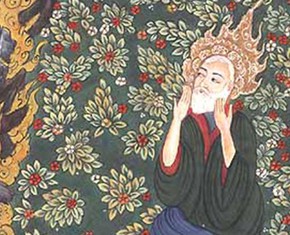The views expressed in our content reflect individual perspectives and do not represent the authoritative views of the Baha'i Faith.
Many prophecies, including those discussed in this Figuring Out Prophecy series, look to the future in terms of the past – so much so, in fact, that sometimes they project the past onto the future!
Let me give you a couple of examples, in general. The idea that “Paradise Lost” will be followed by “Paradise Regained” (to quote the titles of these two epic poems by John Milton) forms one such motif, for instance.
Other prophecies promise that the wrongs and misfortunes that had befallen a given religion, typically through persecution or conquest, will be righted in an ideal world to come.
From a comparative study of apocalyptic prophecies among the world’s religions, a common, end-times scenario foretells that the expected Messiah will wage a worldwide battle and, after gaining victory, pave the way for that particular religion to regain its former power, prestige and glory.
What these scenarios have in common is the idea that renewed religion will become restored religion, meaning that the same religion will be brought back to its former predominance.
If that’s the case, then such a religion would have to be radically updated in order to work within the context of a much different world. Think about this common-sense idea: The times have changed. Therefore, to keep up with the changing times, religion needs to change as well.
Take, for example, the Christian idea of the “Second Coming” of Christ. The widespread expectation is that, when Christ returns “in glory,” Christianity will also make a glorious comeback as well. After all, the idea that Christ would bring a religion other than Christianity makes no sense at all to the average Christian, for whom Christ is “the only way” to salvation, rendering Christianity, by extension, the only way to salvation as well.
Similarly, the “Mahdi,” in Islamic prophecies, will restore Islam to its former glory. So also with “Kalki,” the Hindu Messiah, who will basically defeat, kill, or otherwise banish Buddhists and foreigners, and will restore Hinduism to its former glory. “Shah Bahram,” a Zoroastrian Messiah, is expected to bring back Zoroastrianism. That would be no mean feat, since Zoroastrianism is a dying religion.
Naturally and logically, these and other apocalyptic scenarios, taken together, cannot all come true at once. But if these future visions are partial, prescient and convergent glimpses into a single, universal future, then there must be a way to reconcile, if not merge together, these alternative prophetic narratives. The Baha’i teachings provide that reconciliation by envisioning a world religion.
In this sense, the Baha’i teaching – that, if a religion becomes a source of disunity and evil, then its nonexistence is preferable to its existence – is a key principle to keep in mind as to why there needs to be a new religion:
… religion must be conducive to love of all, the cause of fellowship, unity and light. If it be the cause of enmity, bloodshed and hatred, its nonbeing is better than its being, its nonexistence better than its existence. – Abdu’l-Baha, The Promulgation of Universal Peace
In the following passage, Abdu’l-Baha explained:
The universal Prophets Who have appeared independently include Abraham, Moses, Christ, Muhammad, the Bab, and Baha’u’llah. The second kind, which consists of followers and promulgators, includes Solomon, David, Isaiah, Jeremiah, and Ezekiel. For the independent Prophets are founders; that is, They establish a new religion, recreate the souls, regenerate the morals of society, and promulgate a new way of life and a new standard of conduct. Through Them a new Dispensation appears and a new religion is inaugurated. Their advent is even as the springtime, when all earthly things don a new garment and find a new life. – Abdu’l-Baha, Some Answered Questions
Take Christianity, for example. This is what Abdu’l-Baha goes on to say as to why a new religion is needed today:
Consider, for example, that Christ admonished the people time and again to heed the Ten Commandments of the Torah and insisted upon their strict observance. Now, one of the Ten Commandments forbids the worship of images and statues. [Cf. Exod. 20:4–5; Deut. 5:8–9.] Yet today there are a myriad images and statues in the churches of certain Christian denominations. It is clear and evident, then, that the religion of God does not preserve its original precepts among the people, but that it is gradually changed and altered to the point of being entirely effaced, and thus a new Manifestation appears and a new religion is established. For if the former religion had not been changed and altered, there would be no need for renewal. – Ibid.
Baha’u’llah, in his second letter to Napoleon III, responded to the criticism of the founding a new religion in the following way:
More grievous became Our plight from day to day, nay, from hour to hour, until they took Us forth from Our prison and made Us, with glaring injustice, enter the Most Great Prison. And if anyone ask them: “For what crime were they imprisoned?”, they would answer and say: “They, verily, sought to supplant the Faith [Islam] with a new religion!” If that which is ancient be what ye prefer, wherefore, then, have ye discarded that which hath been set down in the Torah and the Evangel? … If this be My crime, then Muhammad, the Apostle of God, committed it before Me, and before Him He Who was the Spirit of God [Jesus], and yet earlier He Who conversed with God [Moses]. – Baha’u’llah, Summons of the Lord of Hosts
To expand on Baha’u’llah’s three examples — of Muhammad, Christ, and Moses — one may say that the new religion that Moses founded was a renewal of the prior religion of Abraham. Similarly, the new religion that Christ established was a renewal of Judaism, from a certain perspective. The new religion that Muhammad established was, in the same sense, a renewal of Christianity.
Baha’is believe that each of these new religions, respectively brought by Moses, Christ, and Muhammad, contained elements of the previous religions. So the phrase “religion renewed” means a Faith that is expanded, updated, in keeping with the needs and requirements of the times. Each new religion brings new teachings from God, enshrined in each new Holy Book.
On May 24, 1912, at the Free Religious Association (or Unitarian) Conference in Boston, Abdu’l-Baha explained this concept of religious renewal in terms of spiritual and social evolution and the progressive nature of new religious teachings:
Religion is the outer expression of the divine reality. Therefore, it must be living, vitalized, moving and progressive. … All things are subject to reformation. This is a century of life and renewal …
The Prophets of God voiced the spirit of unity and agreement. They have been the Founders of divine reality. Therefore, if the nations of the world forsake imitations and investigate the reality underlying the revealed Word of God, they will agree and become reconciled. For reality is one and not multiple.
The nations and religions are steeped in blind and bigoted imitations. … It is evident, therefore, that this condition will not be remedied without a reformation in the world of religion. In other words, the fundamental reality of the divine religions must be renewed, reformed, revoiced to mankind. – Abdu’l-Baha, The Promulgation of Universal Peace
The Book of Revelation’s prophetic promise of “a new heaven and a new earth,” by definition, foretells a new religion, a part of heaven and earth. Baha’is believe that the Baha’i Faith is that promised and prophesied new religion – for religion renewed means a new religion!
















Comments
Sign in or create an account
Continue with Googleor